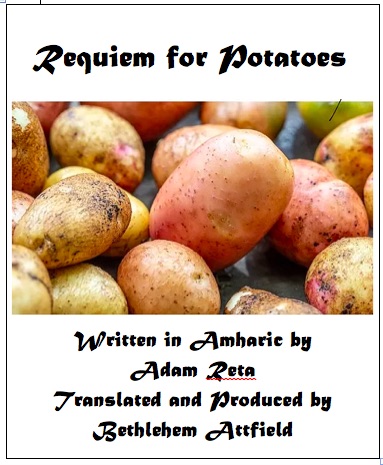Betty, you have just launched a modern-day fable; will you tell us about it?
Requiem for Potatoes was originally written in Amharic by Adam Reta. It is set in a potato farm of unspecified location. The main characters are the potatoes. On the surface the story has a deceptively simple plot; how potatoes fulfil their perceived mission of life. This mission is to die for an ideal they deem to be great. Their ideal is personified in the desire of the farmer, their creator, who requires their sacrifice for his sustenance. However, at a deeper level, the story could be classified as a satirical allegory for all young people who stake their lives for an ideal. I translated the story into English and produced it as an audio musical story. It is now available in seven online stores including audiobooks.com and Google Play.

What is your background?
I am originally from Ethiopia. Amharic is my mother tongue. I studied English Language and Literature at Addis Ababa University. I went to the UK to study for MSc degree in the late 1990s, and I ended up marrying an English man and became a UK citizen. In the past, I worked in diverse professions across civil society support, gender and human rights advocacy with different institutions such as the UN, NGOs, as well as running private business enterprises in Asia and Africa. I am currently based in Nepal and work as a writer, and a literary translator.
I think you have already published translations of other Ethiopian stories. Do tell us a little about these.
Henningham Family Press in London is publishing The Lost Spell, a magical realism genre fiction I translated from Amharic. It will be released in July 2021. An extract from the book was published by Asymptote journal in February 2020. It can be pre-ordered by clicking here The Lost Spell
How did you discover and connect with Adam Reta, the Ethiopian author of
Requiem for Potatoes.
Adam Reta is considered one of the greatest contemporary writers of fiction in Ethiopia. He is particularly known for switching from the traditional logical sequence of writing narratives, to new a style that seems to be more suited to grasp the complex history of Ethiopia’s fragmented society. I contacted him on his social media page to ask if the English translation rights for the story were available. I kept him updated through out the production of the audio musical project. He was very supportive and highly praised the final product.
How did you find your performance artists? Did they need many ‘takes’ for the recordings to feel right?
I again used social media to contact the performance artists and the music producer. They were very keen and committed to deliver high quality music based on my requirements, such as the fusion of traditional instruments and melodies with modern ones.
Were there any words or concepts that were difficult to translate into English that would be intelligible for people who do not know Africa?
Yes, Reta uses some cultural references in the story that made translation difficult. For example in the title of the story the he refers to Mewasit, which is a particular requiem written by the 6th century Ethiopian composer, St. Yared. Since such an archaic reference would be lost to all international readers and most modern Ethiopian readers, I had to resort to translating it in general terms as a ‘requiem’. This word only achieves translation equivalence to a limited extent. To make up for this inadequacy, I introduced the source word Mewasit in the opening sentence where the fictional potatoes’ holy book is mentioned. This gives the reader a chance to research the term and find out more about its meaning.
Why did you decide to launch this charming tale on audio platforms rather than as a physical book or in electronic formats?
The story is written in both prose and verses. It has a regular dramatic structure including setting description, and dialogue written from a communal perspective in a form of chorus, but lacks musical notation and stage direction. So I decided to take it to another level by introducing a musical element, and an audio narration to go with it.
Can you say something about the lessons listeners may draw from the story?
I hope this story would bring to the attention of listeners that the translation of Sub-Saharan African contemporary fiction written in indigenous languages is such an untapped literary resource. I hope this production gives a small glimpse of the linguistic, literary and cultural depth of this genre.
What software package did you use to record the story? Would you recommend it?
I recorded it on Audacity and used Adobe Audition to do the editing. Audacity is very easy to do basic recording and editing, but I highly recommend Adobe Audition to do the kind of technical editing that distributors and retailers require.
Translating a tale is one set of skills. Producing an audio file is another. How did you manage? Did you have help?
I researched online about the different options available to produce an audio book. Considering my limited budget for the project, which I mostly invested in the music production, I had no option but to do the narration and the production myself. So, I learned through online tutorials, what recording devices and software to buy, as well as how to record and edit my work. When I struggled to deal with complex audio technical aspects such as RMS and peak power requirements, my husband who is more tech savvy than I am, stepped in to help.

I don’t think
Requiem for Potatoes is available on amazon? How did you decide where to sell your tale?
I used Findaway Voices to distribute my work. They have access to a large network of audiobook sellers including Amazon. I didn’t use Amazon because they require a print or electronic version of the story to be put on their platform before it could be uploaded as an audio file.
I believe you are translating other fictional works first written in Amharic. Might we see any new work published soon?
I am planning to do an academic research work based on the translation of Reta’s collection of stories Alegana Misir. It will be published by Birmingham University.
Bethlehem Attfield, your author website is
Attfield author site. Do you also share thoughts on social media sites?
I write blogs on https://bettyattfieldblog.wordpress.com/
I also recently founded Ethiopian Literary Translators Network. Their Facebook page is EthiopianTranslators
The book is obtainable from:
Scribd:
https://www.scribd.com/aud.../479209152/Requiem-for-Potatoes
Kobo, Walmart:
https://www.kobo.com/us/en/audiobook/requiem-for-potatoes
Google Play:
Requiem on google
Chirp:
Requiem on Chirp (US)
Apple:
https://books.apple.com/us/audiobook/id1535012368